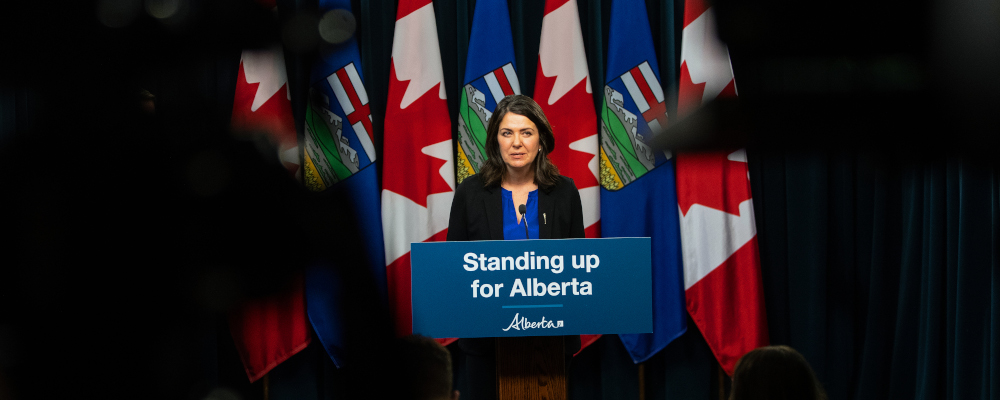Premier Danielle Smith has officially unveiled the Alberta Sovereignty Within a United Canada Act, one of her most widely discussed policies. While the debate surrounding the merits of the policy will now begin in earnest, it appears to be constitutionally compliant based on existing law.
It was not always clear what shape this bill would take, and much remains open to debate. The idea of a law protecting Alberta’s sovereignty was thrust into political discussions by a report called the Free Alberta Strategy. The authors of the report, Rob Anderson, Barry Cooper, and Derek From, advocated, among other things, a law that would authorize Alberta’s legislative assembly to:
refuse enforcement of any specific Act of Parliament or federal court ruling that Alberta’s elected body deemed to be a federal intrusion into an area of provincial jurisdiction, or unfairly prejudicial to the interests of Albertans.
This would unconstitutionally oust the jurisdiction of courts in defiance of the rule of law. The idea was reminiscent of South Carolina’s attempt to “nullify” federal laws during Andrew Jackson’s presidency, a dark chapter in the states’ rights controversies that would eventually lead to the Civil War. But Smith’s official description of her plan on her campaign website and the comments following her election as leader of her party did not seem to embrace the idea of nullification. Instead, they focused on provincial non-enforcement of federal laws or programs. And with good reason. As one of us noted elsewhere, a province cannot relieve someone of an obligation to comply with federal laws or ignore court rulings declaring provincial action unconstitutional. However, a province can decline to implement and enforce federal laws or programs.
A province’s ability to do so stems from the division of executive authority outlined in the Constitution, which is a fundamental aspect of Canada’s federal structure. Each order of government has its own executive branch, which is accountable to its legislature and can be tasked with executing its laws. It is not required to implement and enforce the laws or programs of another order of government.
While the Supreme Court of Canada has permitted administrative inter-delegation between the orders of government, it has held that the provinces and the federal government have no “positive obligation” to cooperate with each other. The Court permits and encourages cooperation, but it has never mandated it. Indeed, the Court has held that provinces and the federal government “are coordinate and not subordinate one to the other.” And history shows that the provinces have availed themselves of the ability to decline enforcement of federal laws.
This brings us to the bill released on Tuesday.
The proposed law begins by making clear that it should not be “construed” as “authorizing any order that would be contrary to the Constitution of Canada”. It then operationalizes the distinction mentioned above and notes that it does not authorize a directive to “a person, other than a provincial entity, that compel the person to act contrary to or otherwise in violation of any federal law”. In other words, the Alberta Sovereignty Within a United Canada Act and the orders made under it do not and cannot relieve individuals from their obligation to comply with federal laws.
That being said, one point merits clarification because the latter clause exempts a “provincial entity” from its scope. On the one hand, this could be read as permitting provincial officials from refusing to comply with federal laws of general application, which cannot be done. On the other hand, in our view, when read in conjunction with the indication to avoid construing the law in a manner “that would be contrary to the Constitution of Canada”, the proposed law exempts provincial entities because it is directing them, in their executive capacity, to contest the reach of federal laws should that be necessary. For instance, if a federal law or program mandated provincial implementation or enforcement of federal laws, which is unconstitutional, the provincial executive could decline to obey that aspect of the law.
To use an example: provincial officials can be required to comply with laws of general application in the Criminal Code if they choose to engage in such activity, but the provincial executive branch is not required to investigate and prosecute the offences carried out by their own provincial officials. Therefore, the bill does not and cannot authorize provincial nullification of federal laws.
Instead, the proposed legislation appears to be focused on the issue of provincial non-enforcement, which is wholly constitutional. It bears noting that, when the provinces do decline to enforce federal laws, they usually do so through executive action. In addition, the provinces need not justify their decisions to decline enforcement of federal laws. These decisions are usually announced through a press release or ordinary legislative action without much fanfare.

In this case, section 3 of the Alberta Sovereignty Within a United Canada Act goes beyond that requirement by providing the grounds on which the legislature may approve a resolution—that is, if, “in the opinion of the Legislative Assembly”, a federal initiative: (i) intrudes into provincial legislation jurisdiction; (ii) violates the rights and freedoms of Albertans under the Canadian Charter of Rights and Freedoms; or (iii) causes or is anticipated to cause harm to Albertans. In other words, the law requires the legislature to provide reasons for declining enforcement of federal laws or programs.
The province can even decline to enforce federal laws if the courts rule that those laws are constitutionally compliant. For example, if the Supreme Court had held that Canada’s abortion laws were constitutionally compliant in 1988 instead of striking them down, Quebec would still have been under no obligation to enforce them itself. It could express its disagreement with the courts and require the federal executive to enforce the laws itself, with its own funds.
While this does not prevent the federal executive from enforcing its own laws, declining provincial enforcement can sometimes be effective in practice because the federal government often relies on provincial cooperation. Accordingly, there is no doubt that this legislation will have teeth. And indeed, historically, the Canadian provinces and sub-national entities in other federal systems have used non-enforcement as a structural protection of liberty and a check on government power. The actions taken by some American states and cities in response to some of former President Donald Trump’s policy decisions are perhaps the most prominent recent example. But as long as Alberta limits itself to provincial non-enforcement, its actions are constitutionally compliant based on existing law.
More controversially, the bill includes so-called “Henry VIII clauses”, which allow the executive to amend laws passed by the legislature. Some have argued that these clauses are fundamentally undemocratic because they circumvent the legislative process. And indeed there is a proper concern in Canadian democracy about the expansion of executive power, particularly the power of the prime minister or premiers, at the cost of cabinet and the legislature. Henry VIII clauses may contribute to this problem. While we believe those advancing this position raise important points, we note that these clauses have not been held to be unconstitutional. Indeed, the Supreme Court recently reaffirmed their constitutionality in the References re Greenhouse Gas Pollution Pricing Act, over the objection of Justice Côté’s dissent on this point.
We would add that the Henry VIII clauses deployed in this bill appear to be less democratically objectionable than those previously endorsed by the Supreme Court. The purpose of the clauses at issue here, as we understand them, is to give effect to a resolution of the legislature. Put differently, rather than have every relevant provincial law amended through the legislative process, the Alberta Sovereignty Within a United Canada Act provides that, once the legislature has made its policy choice known through a resolution, the executive has the tools to operationalize that democratic decision.
That is, the bill does not provide the executive with the discretion to amend any provincial law at will. It can only do so in an effort to give effect to a resolution approved by the legislature. Crucially, any such amendments must comply with the Constitution. In some cases, no change will be needed because provincial non-enforcement can be done through ordinary executive decision-making. However, in cases where provincial legislation speaks to the method of enforcing federal laws or cooperating with the federal government, the legislation at issue will need to be modified to reflect the legislature’s policy decision.
In sum, the Alberta Sovereignty Within a United Canada Act as written appears to be constitutional and consistent with our constitutional tradition, in which federalism is a foundational principle that does not entail central domination. This does not mean the provinces should decline to enforce federal laws, but simply that the Constitution does not prevent them from doing so.
Recommended for You

Half of childless Canadian women don’t want kids, nearly a quarter in their 40s aren’t mothers: Statistics Canada

Stop calling Mark Carney a closet conservative

Parliament returns: What’s Carney’s governing record so far?

Young conservatives must reject growing identity extremism



